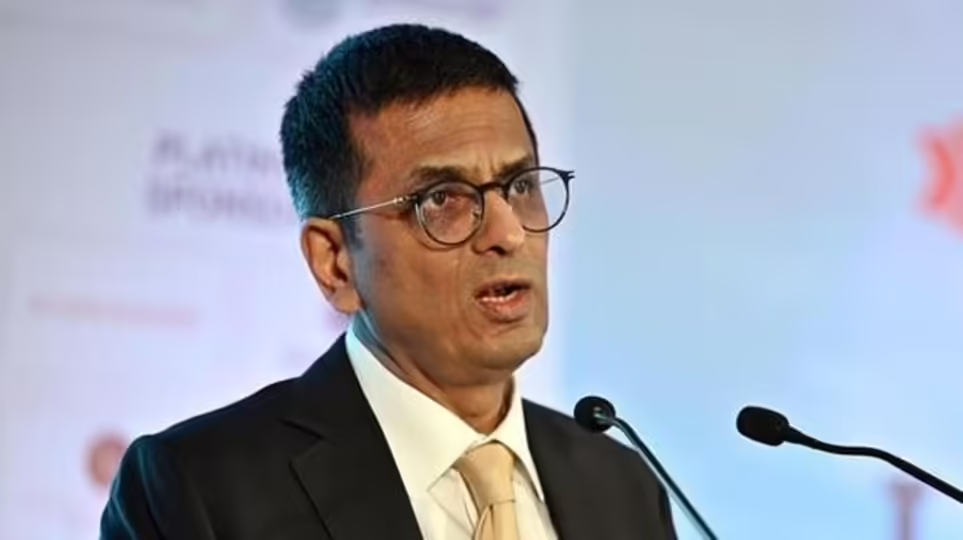"Ex-CJI Chandrachud Proposes Unified Judicial Recruitment to Enhance Justice Delivery
Wed, 19 Feb 2025

Former Chief Justice of India (CJI) Dhananjaya Y. Chandrachud has called for a transformative overhaul of India’s judicial recruitment system through the creation of an All India Judicial Service (AIJS), emphasizing the need for a unified national examination to address systemic inefficiencies and federal-state tensions. Speaking at Odisha Television’s Foresight 2025 convention in Bhubaneswar, Chandrachud argued that a centralized merit-based recruitment process would integrate talent across states while respecting regional reservations, thereby strengthening India’s judiciary as a cornerstone of economic growth and citizen rights. Chandrachud highlighted the stark disparity in India’s judge-to-population ratio, which stands at approximately 21 judges per million people—far below global standards—and stressed the urgency of filling over 5,000 vacant judicial positions nationwide. He linked these vacancies to delayed justice, infrastructural deficits, and a lack of public trust, particularly in district courts, which handle 85% of India’s litigation. “An efficient judiciary is critical for both citizens’ rights and investor confidence,” he noted, pointing to the economic repercussions of prolonged trials and opaque processes. The proposal for AIJS seeks to centralize recruitment for district judges through a common entrance exam, allowing candidates from states like Tamil Nadu or Odisha to serve in other regions. This model, Chandrachud argued, would foster national integration while accommodating state-specific reservation policies. For instance, a merit list could be adjusted to reflect regional quotas, ensuring diversity without compromising on quality. However, he acknowledged states’ federal concerns, noting their apprehension that centralized recruitment might dilute local autonomy. “A balanced approach is essential,” he stated, urging dialogue to reconcile national standards with state sovereignty. Critics, however, question the feasibility of AIJS. Structural challenges, such as language barriers in district courts—where proceedings are conducted in regional languages—could hinder non-local judges’ effectiveness. Additionally, constitutional provisions under Article 312(3) restrict AIJS to district judge-level appointments, leaving lower judiciary vacancies unaddressed. Legal experts argue that 67% of High Court judges are appointed from the Bar, raising concerns about sidelining experienced judicial officers in favor of centralized recruits. Chandrachud also addressed systemic delays in bail adjudication, expressing concern over district judges’ reluctance to grant bail even in non-serious cases. Citing the Supreme Court’s disposal of over 21,000 bail applications between 2022 and 2024, he reiterated the principle of “bail as the rule, jail as the exception,” urging judges to balance societal safety with the presumption of innocence. “A culture of distrust burdens our judiciary,” he remarked, referencing cases where trivial adjournments by lawyers and procedural delays prolong trials for years. The former CJI further underscored the need for mindset reforms within the legal fraternity, criticizing lawyers for frequent adjournments and unpreparedness. He advocated for technological integration, such as digitized case management and virtual hearings, to reduce pendency—a measure accelerated during his tenure amid the COVID-19 pandemic. These steps, he argued, align with India’s transition toward a “highly developed economy,” where judicial transparency and efficiency are prerequisites for global competitiveness. While Chandrachud’s vision has garnered support for its potential to standardize judicial quality, skeptics warn of risks like political interference in centralized appointments. Drawing parallels to the U.S. Supreme Court’s politicization, analysts caution that AIJS could expose junior judges to governmental influence, undermining judicial independence. “The collegium system, though imperfect, insulates judges from external pressures,” noted a legal policy report cited in the debate. Chandrachud’s advocacy reflects his broader legacy of reform, marked by landmark rulings on privacy rights, decriminalization of same-sex relationships, and gender justice. As India grapples with a backlog of 48 million cases, his call for AIJS represents both a pragmatic solution and a philosophical shift toward a more cohesive, rights-centric judiciary—one that harmonizes federal diversity with national unity.
